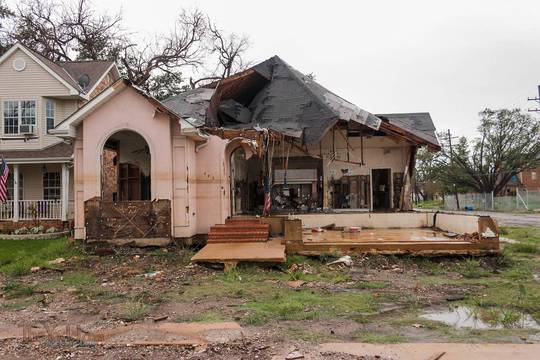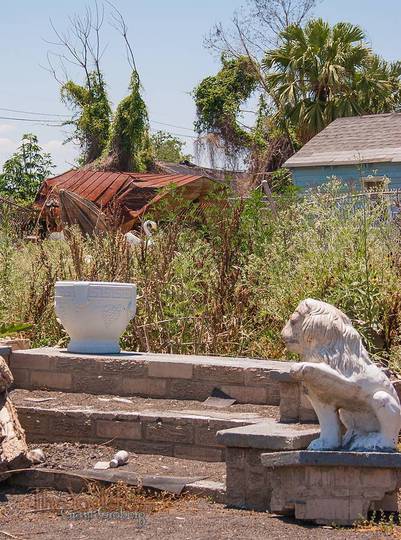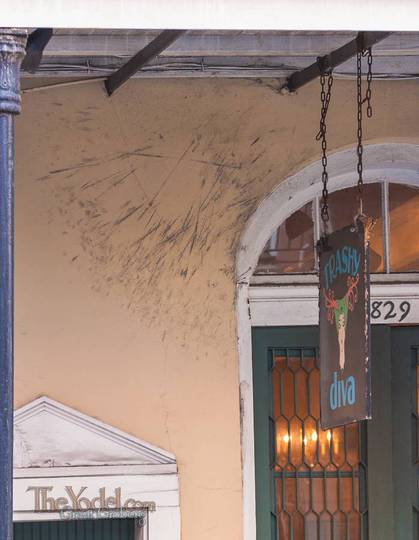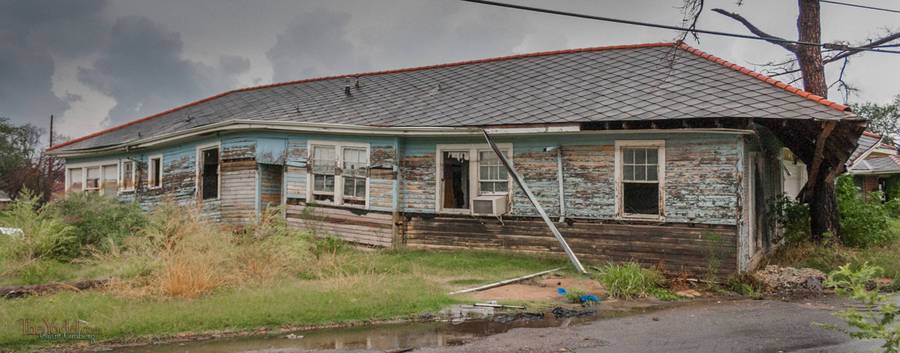Hurricane Katrina
I came down to New Orleans, almost on a whim, to see my brother who was here for a week to play in a volleyball tournament. I figured, on the side, I could get some info on New Orleans, take some pictures of the Katrina damage and write some stuff about it, yadda yadda.
Because I was photographing volleyball teams during the tournament, I didn't have much time to get out of the warehouse district for most of the first week. The warehouse district is on higher ground and wasn't flooded.
The first time I had a chance to get out, I was driving around, orienting myself to the city and looking at some of the flooded areas. I began to notice a mark around everything. A dirty smudge about six inches wide. It was everywhere, everything had it, trees, houses, fences. A straight, level line that encircled everything I saw. It was the high water mark. Where I was driving it got to as high as three or four feet. I was impressed but for houses secured to foundations that much water isn't devastation. It was bad, very bad, but the neighborhoods I drove through still had a feeling of life and people were living there.
While three or four feet of water may not seem to have done too much damage to the structure of most houses from the outside. Three or four feet of water, however, will destroy the contents. All of the appliances, furniture and sundry items soaked by the floodwaters are a write off. The plaster & drywall will havebecome saturated and need to be replaced. For a business this is devastating. You can live in a house with no furniture or appliances But when all of your business equipment has been destroyed by a flood, the remaining walls do you no good, everything you need to make a living is gone. One or two feet of water is enough to destroy some businesses. This factor has caused the closure of a huge number of small businesses with a ripple effect that I address later.

Everybody has a hurricane story. At a Restaurant in the Garden District (which had no flooding, but was still damaged. The canopy of oak trees that roofed Magazine street for nine miles was stripped barren of leaves and small branches. Windows were blown out and roofs opened to the sky.) A maitre'd told a group of volleyball players tales of the community joining together and looking out for each other; pooling resources so that everybody had enough. The owner of the Restaurant also owned a hotel downtown that wasn't damaged. He sent all of his employees and their families to live there and hasn't charged a penny of rent. It was heartwarming and enriching. Most people are good. Most people will hang together and help each other out. This is not what you saw on the TV News about Katrina. Never the good stuff. How people were doing this. How they were banding together, seeking out their neighbors, and taking care of each other through the worst of times.
A couple I spoke with, both natives of New Orleans, told of how every house they lived in during their 40 years of marriage is now gone, swept away by the floods in the lake district. They took out a map as they were talking to me and showed me how to get to the areas that were hard hit. My first foray into what I thought were the areas of devastation was only the tip of the iceberg. A few days later I drove out there. Out to the Ninth Ward where they were completely flooded out.
It is difficult to describe the experience. I've seen places hit by tornadoes where there was nothing but foundations remaining for a block. No sign of anything else. The flood damage from the levee breaking was nothing like that. In the Ninth Ward I drove through block after block of houses that had been completely flooded out. Twelve feet of water. Neighborhood after neighborhood, empty, abandoned. It was a ghost town. Mile after mile of empty houses with no signs of life. Some with cars still in the garage, entire lives abandoned and left behind. Some of the neighborhoods were of newer construction, everything looked ok on the outside, but on the inside they had been soaked up to the rafters. Drywall melted off of the studs, everything ruined. The people were gone. In these neighborhoods perhaps one in thirty people came back to try and recover their losses.
In the older neighborhoods, many of the houses had been floated off of their foundations and resettled sometimes twenty or thirty feet from where they once stood. Set at cockeyed angles against their neighbors. In these places no one seems to have come back. Wherever the former residents resettled, they have begun life anew in a place that has the things they need on a daily basis.

The absence of the people everywhere I drove screamed the silence. Last August there were children playing here, neighbors having barbeques, people going about their lives with their friends and loved ones. There were schools, businesses. Now they are all gone. Dispersed by Katrina's winds. Empty and desolate. It was heartbreaking to drive through so much utter loss. So much loss that the owners can't bear to return to see what might be left. An entire community, no, dozens of communities broken, lost, devastated. The sadness I found in those neighborhoods is bottomless.
When the volleyball tournament was over, I moved to a hotel in the French Quarter . I started meeting people, listening to them. The French Quarter is the heartbeat of New Orleans. It is the Soul of New Orleans and an important economic base for the City. The French Quarter is a place you fall in love with and the people who love it do so with a passion that runs deep, more so than many places I have been. Many folk never left or came back as soon as they could. The French Quarter didn't suffer the physical devastation of the other areas but in a way the damage seems more profound because it is carried about by the living.
Imagine, coming back to your home as soon as you are able or you never left. Your city has been turned into a war zone; armed guards patrolling the streets; the sounds of helicopters all night. It is an invasion. And in the aftermath the city you love has been raped. You are living in the same house with all of your stuff but the city around you, seemingly unchanged is gone. Half of your friends have left, possibly never to be seen again. All of the little bits of your life that you used to take for granted are broken up. You favorite books store is gone. The place where you took classes or exercised, gone The bakery, music store... all gone. Your dentist left for the hurricane and set up practice in a new city. Your life is like Swiss cheese, holes in it everywhere. Every day there are reminders of how what you once had is gone. Every aspect of your life is effected.
But everyone forges onward. Running businesses either short on staff or short on clientele. Working hard, to rebuild what they had. To bring back the city that they love. It must be so difficult. Seeing how far they need to go and having the hollow knowledge of how so much of what they have loved is gone forever. Network of friends, broken. Cherished, long standing businesses closed. Just as the hole in the New York skyline created a hole in the hearts of millions of New Yorkers, the winds of Katrina perforated the lives of Millions of New Orleanians. The scars are not visible to the eye but they are there nonetheless.

For the business owners of the French Quarter things are brutal. People are not coming to New Orleans. The News Media is only showing the negative things about New Orleans and the business people think it is scaring people away. Business is down 60% for most, others more. There were bursts of business from the contract workers and the Jazz Fest, but with the long hot summer ahead small business people are worried. The landlords are not giving breaks on the rent and survival through the slow, summer months is a concern. The essence of the French Quarter is the wild individuality. The innovation of a thousand small business people and shops each doing business their own way. A creative diversity that gives fire to the French Quarter experience. What happens if the backs and pocketbooks of the French Quarter small business person is broken and the empty storefronts filled back up by the deep pocketed corporate concerns or business people with no creative drive? McDonalds? Or, even worse, Disney?
New Orleans is still a wonderful, safe place. On Wednesdays there is a free jazz concert in the park. There are lots of great jazz clubs open in the Quarter, try Snug Harbor on Frenchmen Street any day of the week. The Quarter has hundreds of places to eat, hear music, and experience the scene. In the Summer there is Air Conditioning, don't be afraid of the heat. Buy a ticket, come to New Orleans and spend time in the French Quarter. Spend money there too. There are antique shops and art galleries and places filled with all kinds of curios. It is a lively wonderful place that you, too will fall in love with.


 Hurricane Katrina
Hurricane Katrina